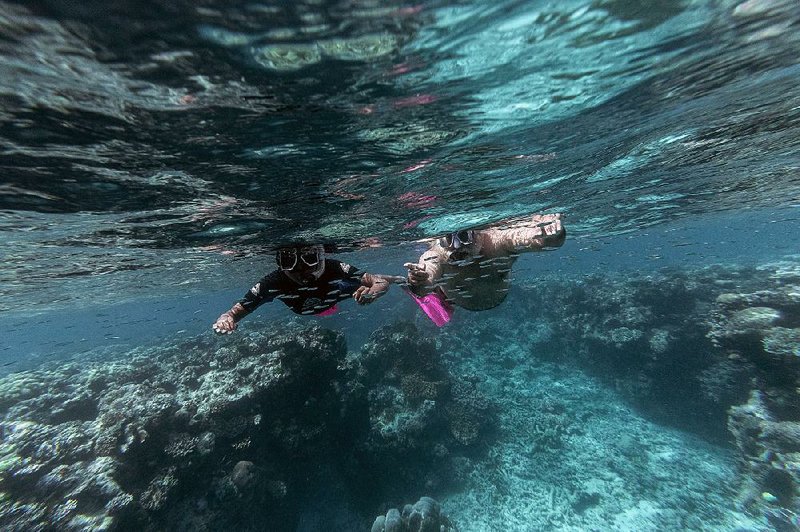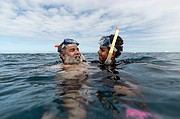MILLN REEF, Australia -- Murrumu of Walubara and his son, Thoyo of Walubara, paddled in the clear waters of the Great Barrier Reef, among corals of electric purple and burnt orange, trumpetfish, sea cucumbers and giant clams.
They were 35 miles off the coast of Australia -- or, as Walubara says, what most people refer to as Australia.
To him and his followers, the Great Barrier Reef is a part of the Yidinji Territory, a self-declared nation spanning more than 6,000 square miles in the northeastern part of the continent, which Walubara formed in 2014 but to which he says sovereignty was never ceded.
Five years ago, after realizing that as an indigenous man he was not recognized by Australia's constitution, Walubara quit his job as a political reporter and renounced his Australian citizenship and former name, Jeremy Geia. He returned his passport, public health care documents and driver's license to their respective government departments, he says, and destroyed his Australian bank cards.
"I had assumed that I had true and correct membership inside the Commonwealth of Australia," Walubara, who is now 45, recounted writing in the accompanying letters to each government department. "I have made a mistake: I'm no longer eligible for the benefits of your society," he wrote. "Here are your instruments back."
While experts say that Walubara has a long road ahead before Australia would recognize his claims to sovereignty, his argument has caught the attention of the public and the Australian news media. It also bears political weight in a country that has yet to recognize indigenous Australians in its constitution or to make a treaty with the marginalized population, who have long sought a voice in Parliament.
Now, with the recent re-election of a conservative Australian government that has promised a referendum on the issue of constitutional recognition, Walubara, who is the Yidinji Territory's minister of foreign affairs and trade, is again pressuring federal leaders to make a treaty with the Sovereign Yidinji Government. A not-for-profit entity, it has a Cabinet of 10 ministers and, so far, close to 100 citizens (most of whom have both Australian and Yidinji citizenship).
Being recognized within a Commonwealth framework, Walubara says, is insufficient. Treaties with sovereign indigenous governments are the only appropriate remedy, he says, for the exclusion and pain inflicted on generations of indigenous people, who are thought to have inhabited Australia for at least 65,000 years before being displaced and in some cases massacred after the British arrived in the late 1700s.
"We're not going away, and we don't want the Commonwealth of Australia to go away. However, it is on our territory," Walubara said.
His government doesn't want compensation, he said, but only for Australia to recognize the Yidinji Territory as an official entity, and the right to maintain a police force and an army.
"That's as simple as it is -- it's just paperwork," Walubara said. "This is the absolute remedy."
Walubara was born in 1974 in Cairns, in Australia's north, to an aboriginal mother and Croatian Jewish father. He sought answers for his feelings of displacement while traveling through dozens of countries including Cuba (he immersed himself in communism) and Mexico, and, eventually, in journalism, where he believed he could hold the powerful to account.
He spent two decades as a reporter, in 2012 conducting one of the first interviews with Julian Assange at the Ecuadorean Embassy in London and rising up the ranks of the Australian news media to become a political reporter in Canberra, the nation's capital. There, he says, he grew frustrated both with the repetitive stories about indigenous Australians' high incarceration and suicide rates and the childish antics of the country's politicians.
"I thought people deserved better than this, and if indigenous people were pinning their hopes to that kind of leadership, then good luck," Walubara said.
It was at that time that he began to fully comprehend his own exclusion from the constitution and began researching what it would take to move toward a treaty between Australia and its aboriginal and Torres Strait Islander peoples.
"I realized that they weren't going to do it," he said of Australia's leaders, "so I had to."
Friends were surprised but mostly respected Walubara's decision to leave his job.
"He gave away a very strong career," said Mark Davis, a former colleague. But "he's a man of his own principles" Davis added. "I think it's remarkable, and history will vindicate him. Most people don't give him the seriousness that he's due."
Now, Walubara survives mainly on the goodwill of the supporters of his mission. He lives on the ground floor of a friend's home in Cairns with his son, 11, and wife, who is also an activist.
He is not registered under his current name for Australian services, including health care, which caused worry and frustration when, during a recent health scare, he refused to identify himself to a hospital's staff as anything other than a Yidinji man, Davis recalled.
In 2015, Walubara was arrested over driving with Yidinji-issued license plates. He has since stopped using them in an effort to establish a working relationship with federal government ministers.
But at every other opportunity, Walubara pokes at assumptions of Australian sovereignty and land ownership in the region where he lives: "It's just a truth that's unfamiliar to you," he tells people who don't follow his line of thinking.
On a day in early August, friends had organized for Walubara to take Thoyo on a trip to the reef for his birthday. Onboard, he spoke with tourists from India, Austria and the separatist Spanish region of Catalonia, questioning some about their rights to work in or visit Australia and confounding others with his mission.
"See, the Catalonians get it," he beamed.
From Walubara's point of view, his mission is simple: The Sovereign Yidinji Government wants recognition but is content for Australia to police and conduct other administrative functions on its territory and to represent its interests at the United Nations, so long as Yidinji ministers have a final say on environmental issues, for example, and the capacity to fund projects including a school and university, which he says would provide better outcomes for aboriginal youth.
The ministers argue that in signing on to the U.N. Declaration on the Rights of Indigenous Peoples, Australia has already committed to allowing them to self-govern and receive restitution.
While some experts said that the United Nations' declaration might support Walubara's position, making a treaty possible in theory, they consider it unlikely that the Australian government will to go to the negotiating table in the near future.
Anne Twomey, a professor of constitutional law at the University of Sydney, said that it was important that Walubara's claim is for political sovereignty as opposed to legal sovereignty.
The Uluru Statement from the Heart -- a road map for recognition created by representatives of various indigenous groups in 2017 -- described this kind of political sovereignty, she added, and individual states in Australia have taken steps toward creating treaties, but none has been ratified.
A "limited degree of political control or recognition" might well be possible for the Yidinji Territory, Twomey said, should the Australian government choose to confer it.
Walubara does have his critics. Some insist he is merely an attention seeker, while others say that despite good intentions, he has achieved little in the five years since renouncing his Australian citizenship.
But others describe him as a bold leader carving a path for future generations.
"He's one of the great elders of this land," said Isaac Cassady, 19, who lives in Cairns and identifies as being of Yidinji descent.
"It's not about guilt tripping people or blaming people," he added of Walubara's mission. "It's about working together to recognize, respect and move on."
For Walubara, the road ahead may be lonely and fraught, but he remains convinced that a treaty will occur in his lifetime. Looking at other struggles around the world, he said he had come to appreciate that there was no shortcut to healing the wounds of history.
"The peaceful way is the best way," he said, "even if it is the longest."
SundayMonday on 09/15/2019


